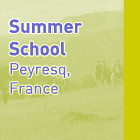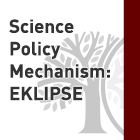Nature provides solutions to Europe’s woes? -- Conference press release
Ghent, 19th of May 2015 -- Nature-Based Solutions to societal challenges have come to the forefront all over the world, and interest in such solutions is large in the EU due to the potential economic, labor, social and environmental benefits. These solutions are being developed, e. g. to promote health and well-being, and to revitalize cities. ALTER-Net, Europe’s Ecosystem Research Network, has organized an international conference on May 19th to 20th in Ghent, Belgium, focusing on the potential of Nature-Based Solutions to Societal Challenges in urbanized regions. ALTER-Net has worked in cooperation with the European Commission, under the auspices of the Latvian Presidency of the Council of the European Union.
Nature-Based Solutions is a fast-emerging concept covering a range of approaches that use natural space, processes and species to meet societal challenges. These are challenges of ecological quality, natural hazards, climate change, health and wellbeing, economy and labor, demographics and integration in urban environments and their hinterlands.
Solutions have always used elements from nature. Nature provides humanity with essentials like water, food, energy, shelter, materials and medicines. Nature also enriches us by providing places for recreation, sustainable mobility, cultural experiences and traditions, education, a sense of community and happiness – all things essential to health and wellbeing. Natural processes take care of toxic chemicals and wastes too, and nature-based solutions are used in adaptation to natural and man-made pressures and in disaster management.
Specifically for health, outdoors exercise is a “super-drug” that can significantly reduce mortality. However, a varied and productive nature is needed for that, and this in turn requires the preservation, caring and improvement of green space.
Purely technological engineering solutions used so far have often proven ineffective to address several of the urban challenges. Therefore, we have to look for other types of solutions to the ones currently prevailing. There is growing evidence that nature can fill this gap.
Nature-Based Solutions are potentially a sustainable alternative to a wasteful and short-sighted economic growth model. The conference will examine and discuss how the strong European roots and ongoing developments in such solutions can be harnessed to develop healthy growth and help cities and the globe.
The conference addresses many tricky questions to boost the use of nature for urban health problems: Which solutions are ecologically efficient, economically feasible and socially justified – and why? How can they be evaluated? What options exist to create more healthy urban environments? What roles do research, knowledge and innovation play? Who will be involved? How are solutions framed and taken up by communities?
These questions are dealt with by 200 scientists, administrators, planners, practitioners, including business people, and others coming from most EU countries and many non-EU countries in Europe and beyond.
The conference provides a forum for dialogue across fields of research, policy and practice engaged in nature and urban wellbeing. The event is part of long-term and varied activities with research and practical development in ALTER-Net, the European Community and collaborating parties. During the closing plenary session on Wednesday, experts and stakeholders will discuss the outcomes of the conference, look for policy options, and judge the applicability of the conference outcomes to nature-based solutions.
On behalf of ALTER-Net, representing the Scientific Committee, Timo Assmuth (SYKE), Sanna-Riikka Saarela (SYKE), Dagmar Haasse (UFZ), Katherine Irvine (JHI), Marcus Grant (Univ. West England), Hans Keune (INBO), Maurice Hoffmann (INBO) Additional information: http://www.alter-net.info/outputs/conf-2015
- See below for PDF version...







